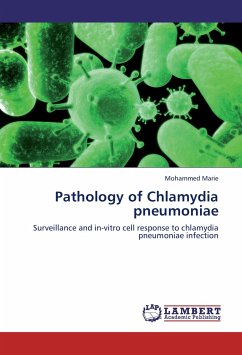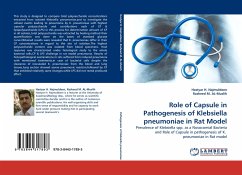
Chlamydia pneumoniae immunology
Innate Immune Responses induced by Chlamydia pneumoniae infection
Versandkostenfrei!
Versandfertig in 6-10 Tagen
52,99 €
inkl. MwSt.

PAYBACK Punkte
26 °P sammeln!
Chlamydiae are common pathogens that cause a numberof serious but preventablediseases in both humans and animals. In the recentyears, Chlamydia pneumoniae has emerged as a majorcause of human respiratory disease and moreimportantly, it has been linked to the establishmentand exacerbation of serious chronic diseasesincluding atherosclerosis and ischaemic heartdisease, multiple sclerosis and reactive arthritis.There has been a lot of research into host responsesto chlamydial infections and the development ofimmunopathology; but considerable gaps in ourknowledge remain. The work described here ai...
Chlamydiae are common pathogens that cause a number
of serious but preventable
diseases in both humans and animals. In the recent
years, Chlamydia pneumoniae has emerged as a major
cause of human respiratory disease and more
importantly, it has been linked to the establishment
and exacerbation of serious chronic diseases
including atherosclerosis and ischaemic heart
disease, multiple sclerosis and reactive arthritis.
There has been a lot of research into host responses
to chlamydial infections and the development of
immunopathology; but considerable gaps in our
knowledge remain. The work described here aimed to
analyse the early innate immune responses in the lung
following C. pneumoniae infections with a view to
better understanding host-pathogen interactions and
the role of the earliest immune responses in the
establishment of persistence and chronic inflammatory
disease.
of serious but preventable
diseases in both humans and animals. In the recent
years, Chlamydia pneumoniae has emerged as a major
cause of human respiratory disease and more
importantly, it has been linked to the establishment
and exacerbation of serious chronic diseases
including atherosclerosis and ischaemic heart
disease, multiple sclerosis and reactive arthritis.
There has been a lot of research into host responses
to chlamydial infections and the development of
immunopathology; but considerable gaps in our
knowledge remain. The work described here aimed to
analyse the early innate immune responses in the lung
following C. pneumoniae infections with a view to
better understanding host-pathogen interactions and
the role of the earliest immune responses in the
establishment of persistence and chronic inflammatory
disease.












